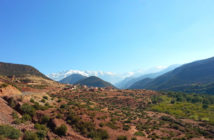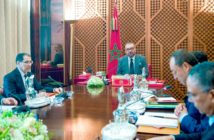As part of efforts to show solidarity with the nation’s poor, the Moroccan government is preparing to set up a public zakat fund.
By Siham Ali for Magharebia in Rabat
![[AFP/Kazuhiro Nogi] Moroccan Minister Delegate Najib Boulif says the kingdom is examining plans to set up a national zakat fund.](http://www.magharebia.com/cocoon/awi/images/2012/11/04/121104Feature4Photo1.jpg)
[AFP/Kazuhiro Nogi] Moroccan Minister Delegate Najib Boulif says the kingdom is examining plans to set up a national zakat fund.
Morocco is moving closer towards the creation of a national zakat fund. The idea was put forward by the late King Hassan II when he called for an entity responsible for collecting alms, but the proposal was never implemented.
Najib Boulif, the Minister Delegate of General Affairs and Governance, recently said that preparations for such a fund were now being made by the Islamic Affairs Ministry, which is working on a management model. The government will then examine implementation mechanisms, the minister told Magharebia on October 24th.
Boulif said that given the very tough economic situation, stakeholders unanimously agreed that the practice of zakat must be expanded.
A zakat fund would enable the government to manage the sizeable sums currently donated by benefactors to organisations outside state control, according to economist Nacer Yahyaoui.
“Streamlining and channelling zakat funds will enable the state to pour large amounts of money into social welfare. Funds could be used to incorporate social aspects into many fields, such as employment, health and education,” he said.
Samira Kassimi, a sociologist, argued that such funds exist in many Muslim countries and that it is now Morocco’s turn to launch one, especially as there are many benefactors who would be willing to pay into it. She said that some members of the public would like to see their zakat money managed by the state so that it could be used for projects that really make a difference. In her view, public mistrust of the authorities is largely a thing of the past.
“The Benkirane administration is inspiring confidence, if only in terms of transparency and efforts to combat immorality. As a result, charitable people would not hesitate to give their zakat to it,” she claimed.
Zakat was mentioned in the Party of Justice and Development’s election manifesto. Before the elections, Abdelilah Benkirane said that Moroccans did not yet feel that they could trust a state body with their zakat as they saw this as a matter between themselves and God, but that the party was determined to examine the issue.
Related Articles
Jobs, finances top Morocco priorities
2012-09-17
Morocco to fight rentier economy
2012-02-03
PJD popularity faces tough test
2012-09-11
Islamic banking may enter Morocco
2012-08-02
Moroccan ministers ousted to further royal reform agenda
2010-01-07
From a religious perspective, zakat is compulsory and a right of the poor, according to Hmida Merroukh, a professor of Islamic education. Every year, Muslims must calculate the amount they will give according to their means and give it to the poorest in society, he said. The donation given must be worth at least 85 grams of gold (2.5% of assets). Zakat is payable by livestock, goods, metals and minerals, fruit, vegetables and cereals.
Public opinion is divided. Some people feel that an institution should be created to manage the charitable giving, while others reject the idea.
Safae Meliani, who works for a private company, subscribed to the former view. She said that some fraudsters embezzle zakat money and use it for their own ends, whereas the creation of a public fund would make it possible to manage donations.
That view was not shared by Ahmed J., a public-sector worker, who said that zakat was an entirely personal matter. He said he feared the prospect of zakat being made compulsory for all citizens at a time when Moroccans are already weighed down by taxes. “Income tax is deducted at source. It accounts for 38% of people’s incomes. Can’t that tax be counted as zakat?” he wondered.
.






